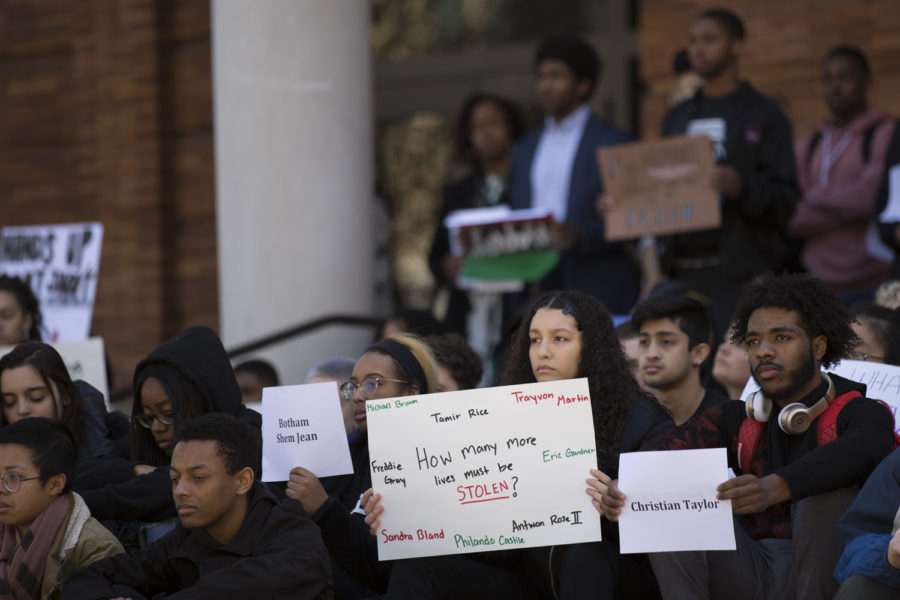Editorial: Allies, know our place
Thomas Yang | Assistant Visual Editor
Students sit outside the William Pitt Union as a part of Black Action Society’s die-in demonstration on Wednesday. Protests have occurred on campus and Downtown over the last six days as a result of Michael Rosfeld being found not guilty after being charged with homicide for his June 2018 fatal shooting of Antwon Rose.
March 27, 2019
More than 100 students attended a die-in organized by the Black Action Society on the steps of the William Pitt Union yesterday in remembrance of 17-year-old Antwon Rose, who was fatally shot by former police officer Michael Rosfeld in June 2018. The demonstration lasted 40 minutes — 10 minutes for each day of Rosfeld’s trial last week — while demonstrators sat in silence.
Though the die-in was silent and demonstrators left a path for nonparticipating students to freely leave and enter the Union, demonstrations like these are just as valid as louder and more disruptive protests. These include the one held on Saturday, when participants marched through downtown Pittsburgh and Oakland, stopping at intersections, blocking traffic and chanting in businesses.
As members of marginalized communities organize against injustice and express their grievances, it’s critical for allies to remember our place while using that to inform our actions at these demonstrations. These demonstrations are a space where allies should be listening and supporting, not leading and taking from the space.
The legitimacy and validity of a demonstration should not hinge on the visibility of white allies and these demonstrations are not a venue for allies to take up space. Knowing our impact on these demonstrations is a crucial part of understanding beneficial roles we can play in elevating and amplifying marginalized voices — not taking away from them.
“It seems like when black people say anything, it seems like we’re just being angry and hostile or complaining,” Dahlia Remy, a first-year psychology major and BAS member at the die-in, said. “I feel like having nonblack allies makes people more comfortable or makes people want to listen more. It’s not like we need nonblack approval, but we do need their support. It is very important that we have other voices with us.”
Supporting marginalized people also needs to go beyond merely posting slogans and hashtags on social media from the comfort of our own homes. Simply posting about our opinions on social media without taking direct action to listen and support is not enough.
“I’ve never been videotaped so much in my life,” Jolia Ellis, a first-year communication major, said at the die-in. “And I feel like they’re just going to post it on Snapchat and be like ‘Justice for Antwon’ just to feel like they’re woke.”
Doing our part doesn’t end with just showing up at these demonstrations. We must also look inward at our own biases and assumptions and how we view these demonstrations. Loud and disruptive protests are often derided as irrational and inconsiderate, but it’s easy for us to view inconveniences in our day-to-day lives as inconsiderate when we’re not the ones directly facing injustice. Rational arguments aren’t just limited to calm, quiet and unobtrusive messages, and we must recognize that to avoid dismissing legitimate grievances.
It is our place to listen and support so allies do not rob marginalized people of the space and attention they deserve to express their demands and grievances. When demonstrations are organized by marginalized communities, we have to understand that it’s not about us. It’s not about what makes us comfortable. It’s not about what we want to do and it’s not about our opinions. It’s about their justified anger.



